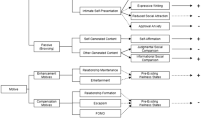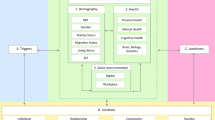Abstract
One social determinant of health construct that is reliably related to health disparities among the Latino population is subjective social status, reflecting subjective ratings of social standing. Yet, little research has explored factors that may undergird variability in subjective social status among this population or in general. Accordingly, the present investigation examined one possible etiological model wherein age moderates the relation between individual differences in anxiety sensitivity (fear of the negative consequences of stress sensations) and subjective social status among a Latino primary care sample. Participants included Spanish-speaking Latino adults (n = 394; 86.5% female; average age = 39.0 years). Results demonstrated an interaction between the anxiety sensitivity and age for subjective social status among the Latino sample. Inspection of the form of the significant interaction indicated that the association between anxiety sensitivity and subjective social status was evident among older, but not younger, persons. The current findings suggest that decreasing anxiety sensitivity, especially among older Latinos, may be one possible viable therapeutic approach to change subjective social status in order to help offset health disparities among this group.


Similar content being viewed by others
References
Stepler A, Brown A. Statistical portrait of Hispanics in the United States. Washington, DC: Pew Research Center. Retrieved from AS Age SSS_12.23.16.docx AS Age SSS_12.23.16.docx pewhispanic. org, 2016. 4: p. 19.
Vega WA, Lopez SR. Priority issues in Latino mental health services research. Ment Health Serv Res. 2001;3(4):189–200.
CDC, Health, United States, 2003: table 68. 2003: Hyattsville, MD: US Department of Health and Human Services, CDC, National Center for Health Statistics.
Hinman AR, et al., Elimination of measles and of disparities in measles childhood vaccine coverage among racial and ethnic minority populations in the United States. J Infect Dis. 2004;189(Supplement 1):S146–52.
Keppel KG, Pearcy JN, Klein RJ. Measuring progress in Healthy People 2010. Healthy People 2010 statistical notes: from the Centers for Disease Control and Prevention/National Center for Health. Statistics. 2004(25):1–16.
Lee S, Laiewski L, Choi S. Racial-ethnic variation in US mental health service use among Latino and Asian non-US citizens. Psychiatr Serv. 2014;65:68–74.
Singh-Manoux A, Adler NE, Marmot MG, Subjective social status: its determinants and its association with measures of ill-health in the Whitehall II study. Soc Sci Med. 2003;56(6):1321–33.
Adler NE, et al. Relationship of subjective and objective social status with psychological and physiological functioning: preliminary data in healthy, White women. Health Psychol. 2000;19(6):586.
Franzini L, Fernandez-Esquer ME. The association of subjective social status and health in low-income Mexican-origin individuals in Texas. Soc Sci Med. 2006;63(3):788–804.
Sanchon-Macias M, et al. Relationship between subjective social status and perceived health among Latin American immigrant women. Rev Lat Am Enfermagem. 2013;21(6):1353–59.
Jackman MR, Jackman RW. An interpretation of the relation between objective and subjective social status. Am Sociol Rev. 1973;38:569–82.
Dunn JR, Veenstra G, Ross N. Psychosocial and neo-material dimensions of SES and health revisited: predictors of self-rated health in a Canadian national survey. Soc Sci Med. 2006;62(6):1465–73.
Ostrove JM, et al. Objective and subjective assessments of socioeconomic status and their relationship to self-rated health in an ethnically diverse sample of pregnant women. Health Psychol. 2000;19(6):613.
Reitzel LR, et al. Subjective social status affects smoking abstinence during acute withdrawal through affective mediators. Addiction. 2010;105(5):928–36.
Garey L, et al. The potential explanatory role of perceived stress in associations between subjective social status and health-related quality of life among homeless smokers. Behav Modif. 2015;40(1–2):303–24.
Zvolensky M, et al. The role of negative affect in the relation between subjective social status and mental health among economically disadvantaged Latinos in primary care. Int J Hum Rights Healthc. 2016;9(4):219–28
Zvolensky MJ, et al. Anxiety sensitivity and subjective social status in relation to anxiety and depressive symptoms and disorders among Latinos in primary care. J Anxiety Disord. 2015;32:38–45.
Talavera DC, et al. Subjective social status and rumination in relation to anxiety and depressive symptoms and psychopathology among economically disadvantaged Latinos in primary care. Am J Orthopsychiatry. 2017. doi:10.1037/ort0000223.
Reitzel LR, et al. Acculturative and neighborhood influences on subjective social status among Spanish-speaking Latino immigrant smokers. Soc Sci Med. 2010;70(5):677–83.
Zvolensky MJ, Garey L, Bakhshaie J. Disparities in anxiety and its disorders. J Anxiety Disord. 2017. doi:10.1016/j.janxdis.2017.05.004.
Taylor S, et al. Robust dimensions of anxiety sensitivity: development and initial validation of the Anxiety Sensitivity Index-3. Psychol Assess. 2007;19(2):176.
Reiss S, et al. Anxiety sensitivity, anxiety frequency and the prediction of fearfulness. Behav Res Ther. 1986;24(1):1–8.
Zvolensky MJ, et al. Diathesis stress model for panic-related distress: a test in a Russian epidemiological sample. Behav Res Ther. 2005;43(4):521–32.
Schmidt NB, Lerew DR, Jackson RJ. Prospective evaluation of anxiety sensitivity in the pathogenesis of panic: replication and extension. J Abnorm Psychol. 1999;108(3):532–7.
Schmidt NB, Lerew DR, Jackson RJ. The role of anxiety sensitivity in the pathogenesis of panic: Prospective evaluation of spontaneous panic attacks during acute stress. J Abnorm Psychol. 1997;106(3):355–64.
Naragon-Gainey K. Meta-analysis of the relations of anxiety sensitivity to the depressive and anxiety disorders. Psychol Bull. 2010;136(1):128.
Zvolensky MJ, Eifert GH, Lejuez C. Offset control during recurrent 20% carbon dioxide-enriched air induction: relation to individual difference variables. Emotion. 2001;1(2):148.
Talkovsky AM, Norton PJ. Anxiety sensitivity across four ethnoracial groups in an undergraduate sample. Cogn Behav Ther. 2015;44(1):33–43.
Feldner MT, et al. A prospective test of anxiety sensitivity as a moderator of the relation between gender and posttraumatic symptom maintenance among high anxiety sensitive young adults. Depress Anxiety. 2008;25(3):190–9.
Cabassa LJ, Zayas LH, Hansen MC. Latino adults’ access to mental health care: a review of epidemiological studies. Adm Policy Ment Health Ment Health Serv Res. 2006;33(3):316–30.
Ortega AN, Alegría M. Self-reliance, mental health need, and the use of mental healthcare among island Puerto Ricans. Ment Health Serv Res. 2002;4(3):131–40.
Watson D, Clark LA, Tellegen A. Development and validation of brief measures of positive and negative affect: the PANAS scales. J Pers Soc Psychol. 1988;54(6):1063.
Zvolensky MJ, et al. Interactive effect of negative affectivity and anxiety sensitivity in terms of mental health among Latinos in primary care. Psychiatry Res. 2016;243:35–42.
Cintrón JA, et al. Factor structure and construct validity of the Anxiety Sensitivity Index among island Puerto Ricans. J Anxiety Disord. 2005;19(1):51–68.
Sandin B, Chorot P, McNally RJ. Validation of the Spanish version of the Anxiety Sensitivity Index in a clinical sample. Behav Res Ther. 1996;34(3):283–90.
Zvolensky MJ, et al. Anxiety sensitivity in six countries. Behav Res Ther. 2003;41(7):841–59.
Adler NE. Health disparities through a psychological lens. Am Psychol. 2009;64(8):663.
Singh-Manoux A, Marmot MG, Adler NE. Does subjective social status predict health and change in health status better than objective status? Psychosom Med. 2005;67(6):855–61.
Reitzel LR, et al. Subjective social status predicts quit- day abstinence among homeless smokers. Am J Health Promot. 2014;29(1):43–5.
Aiken LS, West SG, Reno RR. Multiple regression: testing and interpreting interactions. New York: Sage; 1991.
Hayes A. Introduction to mediation, moderation, and conditional process analysis: a regression-based approach. New York: Guilford; 2013.
Leu J, et al. The association between subjective social status and mental health among Asian immigrants: investigating the influence of age at immigration. Soc Sci Med. 2008;66(5):1152–64.
Schmidt NB, et al. Anxiety sensitivity risk reduction in smokers: a randomized control trial examining effects on panic. Behav Res Ther. 2016;77:138–46.
Wells K, et al. Ethnic disparities in unmet need for alcoholism, drug abuse, and mental health care. Am J Psychiatry. 2001;158(12):2027–32.
Young AS, et al. The quality of care for depressive and anxiety disorders in the United States. Arch Gen Psychiatry. 2001;58(1):55–61.
Author information
Authors and Affiliations
Corresponding author
Ethics declarations
Conflict of interest
No authors have any conflicts of interests or financial disclosures to report.
Ethical Approval
The study was approved by Institutional Review Board at the University of Houston.
Informed Consent
Informed written consent was obtained prior to initiating study procedures.
Animal Participants
No animals have been employed in this research.
Rights and permissions
About this article
Cite this article
Zvolensky, M.J., Paulus, D.J., Bakhshaie, J. et al. Anxiety Sensitivity and Age: Roles in Understanding Subjective Social Status among Low Income Adult Latinos in Primary Care. J Immigrant Minority Health 20, 632–640 (2018). https://doi.org/10.1007/s10903-017-0623-3
Published:
Issue Date:
DOI: https://doi.org/10.1007/s10903-017-0623-3




